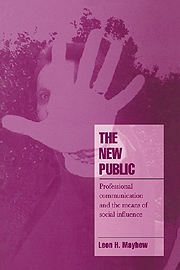Book contents
- Frontmatter
- Contents
- Preface
- Part I Rhetoric and the integration of society
- Part II Influence
- 3 Influence: capacity to persuade
- 4 Habermas and Parsons: critical issues regarding influence
- 5 Public influence: a new paradigm
- 6 The differentiation of rhetorical solidarity
- Part III The New Public
- Notes
- References
- Index
6 - The differentiation of rhetorical solidarity
Published online by Cambridge University Press: 06 September 2009
- Frontmatter
- Contents
- Preface
- Part I Rhetoric and the integration of society
- Part II Influence
- 3 Influence: capacity to persuade
- 4 Habermas and Parsons: critical issues regarding influence
- 5 Public influence: a new paradigm
- 6 The differentiation of rhetorical solidarity
- Part III The New Public
- Notes
- References
- Index
Summary
Confidence in the integrating force of public discussion is a cultural product. Rhetorical contests are enacted within a cultural and institutional framework that legitimizes making and accepting arguments, including argument by appeals to solidarity. Cultural frameworks define what constitutes argument – what counts as persuasive. As a cultural artifact, rhetoric cannot be taken for granted as a natural and obvious realm that requires no explanation. Versions of rhetorical order emerge from historical circumstances as actors set forth explications in the form of ideals, narratives, and theories to justify and to make sense of the persuasive arenas in which they contest meanings and interpretations. The embedding of rhetoric in ideological frames has a profound effect on systems of influence, for these frames define the right to speak and affect the credibility of persuasive efforts.
The establishment of modern associational life required new ways of thinking about social relations, new modes of understanding that signal the arrival of cultural modernity in the social sphere. In modern social structures, connections between people no longer depend on the defining capacity and emotional security of traditional norms and statuses. Rather, normative definitions and obligations are created by conversations about ways of joining together and reaching collaborative understandings. The moral authority of associational arrangements, and their very comprehensibility as well, depend on the institutionalization of these world-making activities.
Cultural differentiation. The development of the modern discourse of association is an instance of cultural differentiation: conceptual elaboration of cultural materials around a special purpose or function. Strictly speaking, cultural differentiation is sociocultural, for its social consequences are carried by groups of specialized experts who, well versed in conceptual apparatus, form a community of discourse.
- Type
- Chapter
- Information
- The New PublicProfessional Communication and the Means of Social Influence, pp. 155 - 186Publisher: Cambridge University PressPrint publication year: 1997



